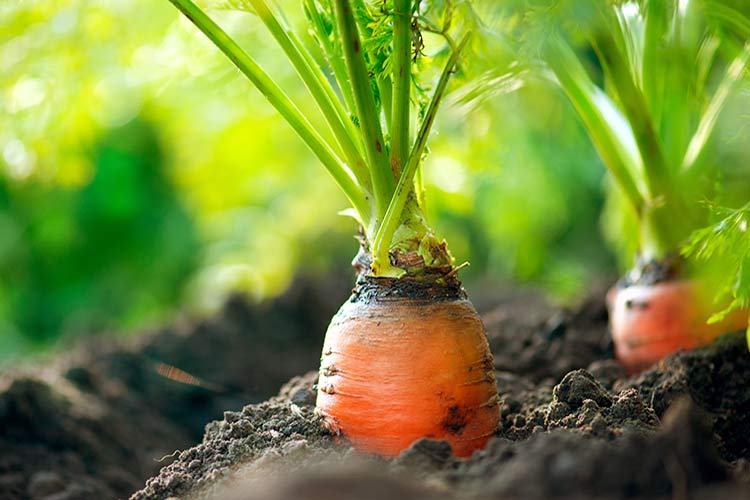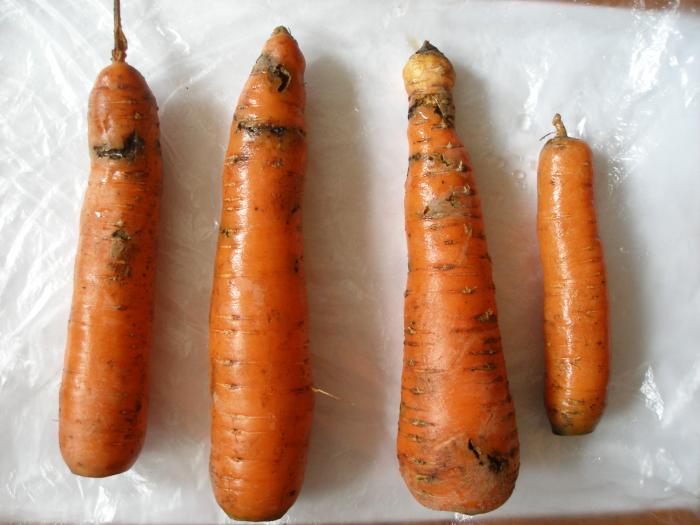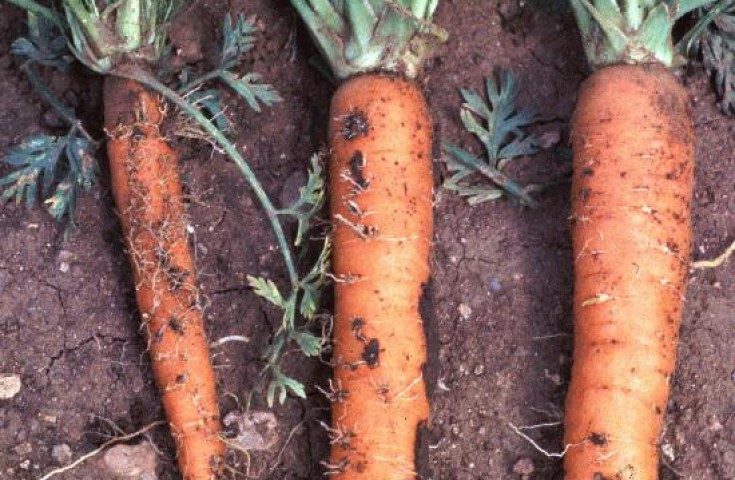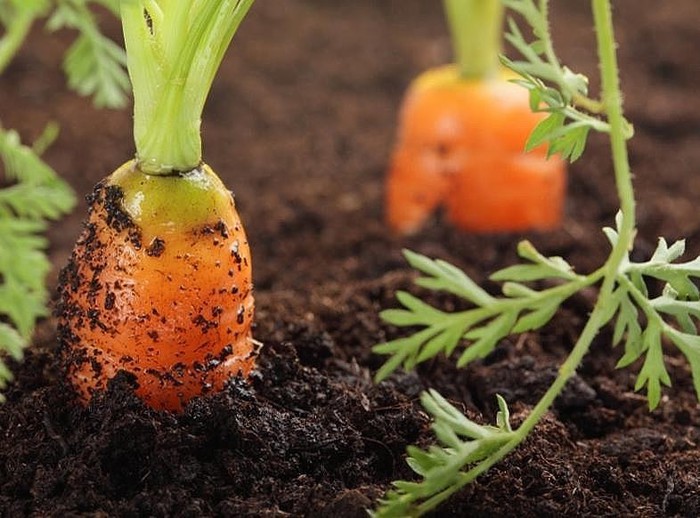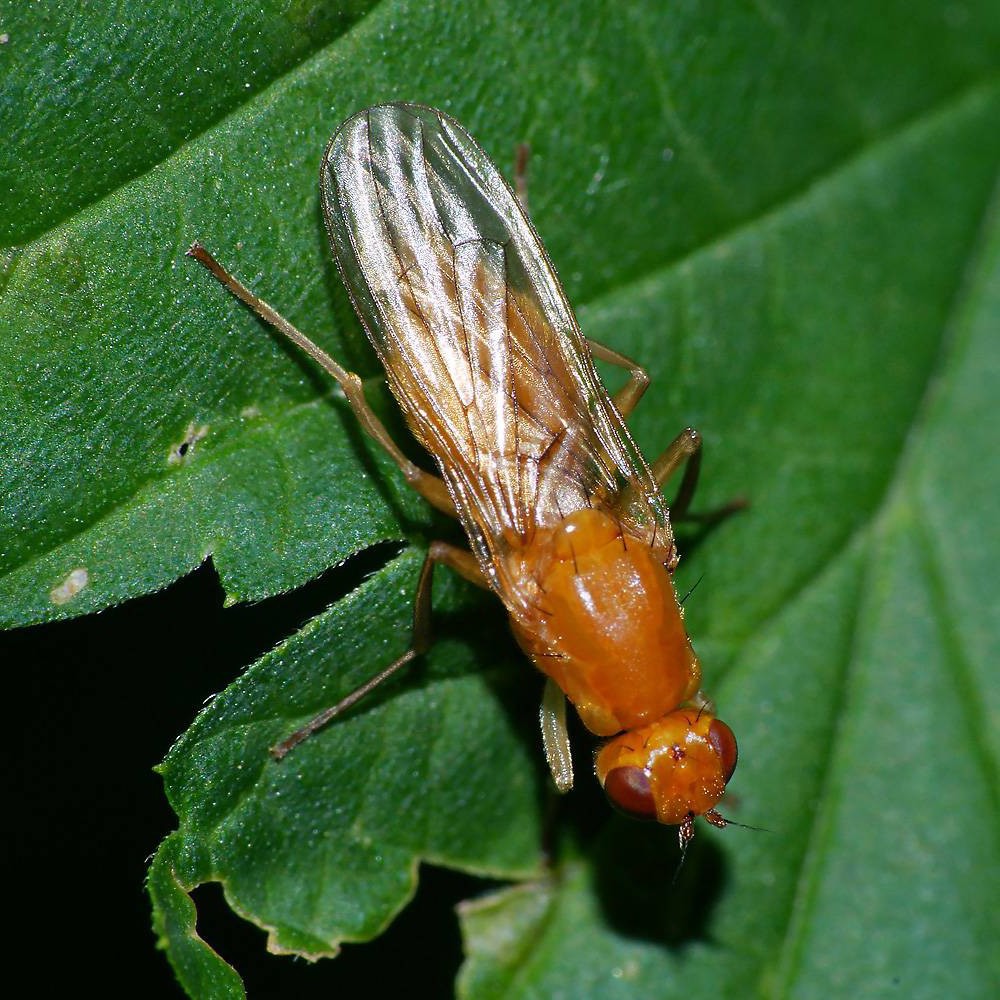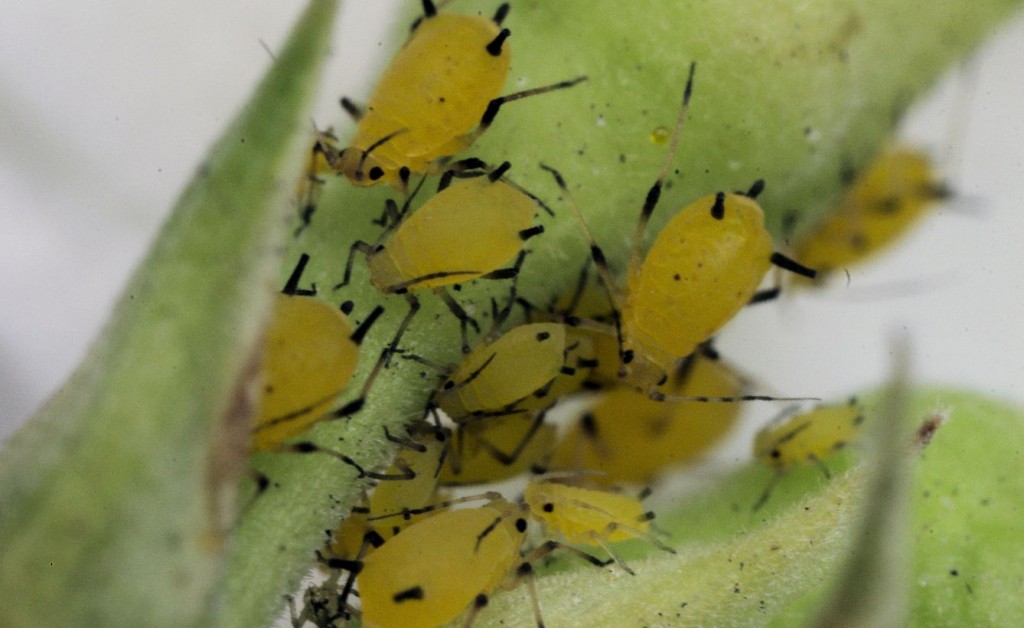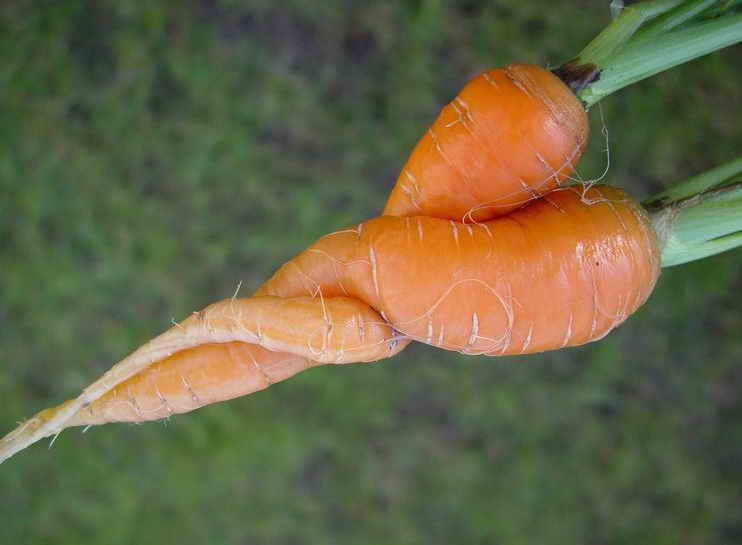Diseases and pests of carrots and their control
Content
Common diseases of carrots
The list of carrot diseases is quite wide. They are provoked by pathogens, most often fungi. As a result, the leaves are affected, the root crop begins to rot, the taste of carrots changes, it becomes unpleasant and bitter. If you do not notice the defeat in time, then it is quite possible that you can be left without a crop. The fight against all these misfortunes must be carried out in a comprehensive manner. In order to start treatment of the beds as early as possible, we propose to consider in detail the diseases of carrots.
Fomoz
This disease is also called dry rot. The fungus infects ripe roots at the end of the growing season, but the first signs of the disease can be seen on the stems. Characteristic gray-brown spots of an oblong shape appear on the petioles and leaves. Dark brown depressions begin to form on the carrots themselves. On the affected areas, you can see small black dots - these are fungal spores. Since the disease first affects the tops, the first spots appear at the base of the carrots.
The disease quickly spreads and is transmitted to other root crops during winter storage, therefore, before placing the crop in the cellar, it must be carefully sorted out and get rid of suspicious individuals. To reduce the risk of fungal spread, the storage temperature should be below + 10 ° C. The fight against the given disease consists in the timely destruction of the tops after harvesting and the introduction of potassium-phosphorus fertilizers in sufficient quantities.
White rot
Also caused by a special type of fungus that lives in the soil. He begins to show himself during the storage of the crop. Some areas of the carrot begin to rot and become soft, although visually, the root crop looks normal. Further, on the rotten areas, a fluffy white mycelium appears with droplets of moisture and black dots.
This fungus is introduced into the soil along with the manure. It is resistant to temperature changes, so it easily survives the winter. The active transmission of the fungus is facilitated by the presence of weeds in the garden bed, overly dense planting and violation of storage rules. You can save your crop from this carrot disease by using the following measures.
Be sure to disinfect the cellar before placing the roots there. Sulfur bombs provide additional protection. Feed the culture with potassium in proportions of 1.5 tablespoons of the drug to 1 bucket of water. Spray carrot stalks with copper products.
Rhizoctonia
The people call this disease - felt rot. Rhizoctonia affects carrots both during storage and during growth. A dark gray rot appears on it, on which a violet-brown crust of felt texture forms over time. At the last stage of the lesion, the plant is covered with black dots. To combat this disease, experienced gardeners use spraying based on copper oxychloride.
Brown spot
Also triggered by a fungus. Can affect all parts of the plant. Young shoots develop dark brown constrictions at the base of the stem. This leads to the death of the plant at the beginning of the growing cycle. If an adult culture is affected, then at first you can notice yellow areas on the leaves, which after a while become darker. If the soil is waterlogged, then the leaves are covered with a black bloom.
As for the testes, the brown spotted is localized at the base of the petioles and on the lower part of the stem. The disease leads to drying out of the affected areas, respectively, the plant dies. You can fight brown spot by loosening the row spacing, as well as spraying with a decoction of celandine, horsetail or nettle.
Bacteriosis
From the name it becomes clear that bacteria are the causative agents of the disease. They attack carrots and testes. The disease begins to spread from the lower leaves. They turn yellow. Behind them, microorganisms attack the petioles of the root crop. In advanced cases, the lesions become dark in color and spread to almost the entire plant.
Infected carrots develop brownish-brown spots and small ulcers. A pungent unpleasant odor appears, which comes from the waste products of bacteria. It is necessary to take care of the protection of carrots from bacteriosis even at the stage of seed preparation. They are kept for 10 minutes in water heated to a temperature of 52 ° C. 20 days after the appearance of the first shoots, it is necessary to treat the planting with the Hom fungicide in a proportion of 40 grams per 10 liters of water.
Powdery mildew
It manifests itself in the form of a white coating, which resembles flour from a distance. The areas affected by the fungus become rough and brittle. Most often, the disease attacks the testes and carrots of the first year. The risk group includes plants growing on infertile soils and not receiving the required amount of moisture. To combat powdery mildew, various complex fungicides are used.
Video "How to deal with carrot pests"
Carrot fly
It is considered one of the most dangerous carrot pests. The flies wake up around the end of May and lay their eggs in the ground next to the carrot roots. You can understand that the larvae have begun to destroy the root crop by the bronze spots on the leaves. After a while, the bush dies. Especially the attention of flies is attracted by late thinned plantings, where there are semi-ripe roots bare. If the larvae are born next to a juicy vegetable, they will immediately begin to gnaw it.
A spoiled root vegetable should not be consumed. The pulp acquires a bitter taste due to the presence of waste products of the larvae. Experienced gardeners note that it is quite difficult to deal with parasites, since these pests of carrots lay eggs twice a season. To protect your crop from meeting carrot flies, we recommend thinning the seedlings in time and keeping the beds clean. It is necessary to get rid of weeds in time and puff up the aisles.
A good level of protection is provided by planting etching with complex insecticides Aklellik KE, Sharpey ME, Tsiper KE, Vega KE, Arriva KE and others. Due to the peculiarities of the life cycle of flies, you need to fight them 2-3 times per season. There is also a folk remedy for these pests. Mix equal proportions of ash, tobacco powder and hydrated lime. Sprinkle the finished mixture on the rows at the rate of 10 grams per 1 square meter of land area. For the best effect, you need to carry out 2-3 treatments at intervals of 8-10 days.
Beetle leaf
These microscopic insects can bring a lot of hassle with them. They are localized on carrot leaves. They also lay eggs there. After a while, larvae hatch from them, which feed on juices from the stems. Adults also suck moisture from the leaves. As a result, the ground part of the carrot dries up and dies.
The bean leaf hibernates on conifers and in the spring begins to look for a suitable home for itself, so first of all try to avoid planting carrots next to pines or spruces. It is recommended to cover young seedlings with a non-woven cloth so that insects cannot settle on the plant. Infusions of orange peels and tobacco dust have a frightening effect on the leaf beetle. Such solutions should be sprayed on areas that have not yet been infected.
If it was not possible to save the carrots, prepare the following remedy for insect control. 1 kilogram of tobacco waste is poured with hot water (10 liters) and infused for 24 hours. The finished infusion is filtered and a weaker solution is prepared in the proportion of 2 liters of infusion per 10 liters of water. At the end, add 30 grams of laundry soap there. The drug is used for spraying.
Winter scoop
These pests of carrots can damage both stems and roots. The adult is a gray-brown butterfly with a wingspan of up to 45 millimeters. Females lay up to 2000 thousand caterpillars on the surface of the soil, which feed on the stems and upper parts of root crops.
Insects do not tolerate the smell of burdock, chamomile and yarrow, so for prevention, spray the beds with infusions of these plants. Also, avoid clogging the area with weeds. Perform thinning in time. Use peritriodic drugs to control caterpillars. During the pupation period of the larvae, abundant watering with a rain nozzle helps.
Naked slugs
They pose a serious danger to root crops. It is worth preparing for the invasion of these pests in case of wet summer and autumn. If the weather was dry, their number can be significantly reduced. Naked slugs, due to their anatomical features, live in places with a high level of moisture. They hide from the sun in rotten foliage, debris, gutters, grass. As a rule, slugs go hunting at night or in cloudy weather. They gnaw holes in ripe fruits, leaving a characteristic shiny mark.
To rid your garden of these annoying parasites, take care of its cleanliness. Thoroughly remove foliage, grass, and other crop residues from areas. Clean out gutters periodically. Do not keep masonry of logs or other structures next to the garden that could theoretically be suitable for the life of slugs.
You can also treat the area with different solutions. A good result is given by spraying with a water-salt mixture of 10% concentration. Fights slugs and superphosphate. It needs to be taken about 250 kilograms per hectare. Another effective method involves treating the soil with a 25% lime solution with the addition of wood ash.
Video "Growing carrots"
From the video you will learn everything about growing carrots.

